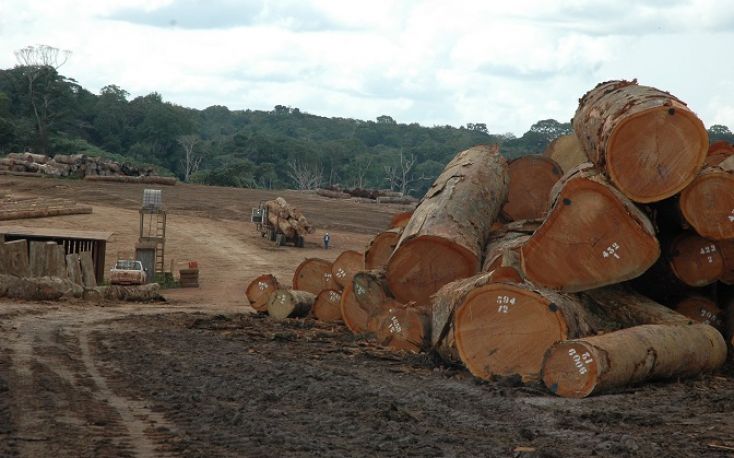The EU’s trade in tropical wood products was more buoyant in the first half of this year compared to the same period in 2018.
Total imports of all wood products (classified in HS Chapter 44) from tropical countries in the first half of 2019 were 1.24 million metric tonnes (MT), 16% more than the same period in 2018. Import value increased 15% to €1.26 billion.
This growth is surprising given that the wider economic situation in the EU has continued to deteriorate this year. In the European Central Bank (ECB)’s latest projections, published in September 2019, the euro-area is forecast to grow only 1.1% in 2019 and 1.2% in 2020. This compares to the ECB’s December 2018 forecast of 1.7% growth in both 2019 and 2020.
According to ECB, “recent data and forward-looking indicators – such as new export orders in [eurozone] manufacturing – do not show convincing signs of a rebound in growth in the near future and the balance of risks to the growth outlook remains tilted to the downside….The longer the weakness in manufacturing persists, the greater the risks that other sectors of the economy will be affected by the slowdown”.
 The ECB observe that the trade war and other geopolitical factors are affecting European output and economic confidence, especially the manufacturing sector. As a result, Germany is “one of the euro area members most affected by the slowdown”, given the importance of its manufacturing sector which contributes 39% of German GDP (compared to the eurozone average of 28%).
The ECB observe that the trade war and other geopolitical factors are affecting European output and economic confidence, especially the manufacturing sector. As a result, Germany is “one of the euro area members most affected by the slowdown”, given the importance of its manufacturing sector which contributes 39% of German GDP (compared to the eurozone average of 28%).
In response to the latest slowdown, in September the ECB unveiled a package of stimulus measures including: a cut in interest rates charged on bank deposits at the ECB, to - 0.5% to encourage lending; a pledge to maintain the ECB’s headline borrowing interest rate at zero indefinitely and at least until there is a robust rise in inflation; and a commitment to restart the ECB’s quantitative easing programme with €20bn of bond purchases each month from November 2019.
For long-standing political reasons, Germany has a strong commitment to a balanced budget and is very reluctant to implement any stimulus measures leading to additional government borrowing.
However, on 20 September Germany unveiled a euro 54 billion (US$60 billion) package over the next four years, ostensibly to speed up the country's transition to renewable energy and reduce carbon emissions, but widely interpreted as part of underlying effort to support the ailing growth.
The German package, which contains a mechanism for monitoring progress on reaching emissions goals, may provide new opportunities for timber products, but that depends on the industry investing time and effort in acquiring the necessary carbon footprint data and getting its carbon messaging right.
At present, prospects for the UK economy appear no better than in euro-zone countries, in fact likely even worse given on-going political challenges. On 16 September, the British Chambers of Commerce (BCC) released its latest economic forecast, downgrading growth expectations for the UK in 2019 to 1.2% (from 1.3% forecast in June 2019) and to 0.8% (from 1.0%) for 2020.
While the BCC expects the UK economy to avoid a technical recession and return to modest growth in the third quarter, downgrades to its GDP growth forecast for 2019 and 2020 reflect a weaker outlook for investment, trade and productivity amid a continued lack of clarity over the outcome of Brexit and deteriorating global economic conditions.
To some extent the rise in EU tropical wood imports in the first half of 2019 is only a reflection of just how poor the market was last year when imports for several commodities barely exceeded the record lows of the 2008- 2009 financial crises.
Nevertheless, it is encouraging that the rise in EU imports so far this year has been consistent across nearly all tropical wood product groups (Chart 1). It also accords with anecdotal reports, from interviews with European importers, of generally robust trading conditions in the first six months, at least in some sectors, notably sawn hardwood.
The latest upturn in imports is also quite well distributed across the EU with imports of tropical wood products higher during the first quarter in all the leading EU markets except Germany and Poland.
In the first half of 2019 compared to the same period in 2018, total imports of tropical wood products increased in Belgium (+20% to 257,400 MT), the UK (+14% to 187,600 MT), Netherlands (+12% to 154,000 MT), France (+13% to 164,700 MT), Italy (+42% to 128,800 MT), Spain (+28% to 62,400 MT), Portugal (+38% to 46,700 MT) and Greece (+8% to 38,300 MT).
In contrast, total first half 2019 imports of tropical wood products in Germany declined 9% to 42,400 MT and 7% in Poland to 34,900 MT. The decline in Germany is partly driven by increasing reliance on indirect imports of tropical wood products from other EU countries by German distributors.









Leave a Reply